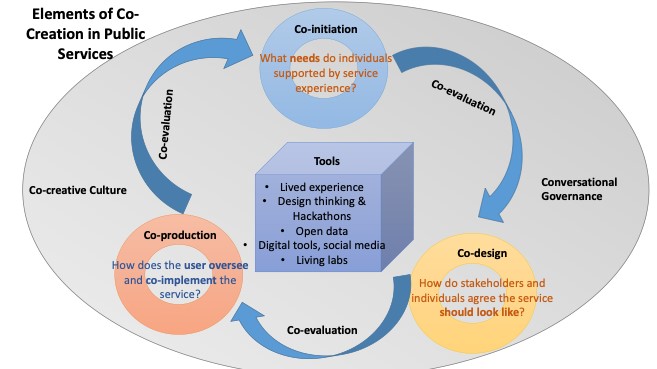Co-creation as a moral reordering?
Co-created services are relational services. Co-creation implies new roles and relationships and requires exploring how they should be arrived at. From a system perspective this has implications for particular service and its broader management and governance.
Service governance is about defining desirable service outcomes and responsibilities. A key moral question that orders governance of all relational services is: who actually gets to participate in the service definition – its aims, contents and delivery format – when, in what roles and on what basis? Of specific importance are the roles of individuals assisted by services and the roles and skills of service professionals (see more under “The Ethical Compass”) as well as what relationships between them that best serve co-creation purposes. Also the contents of service improvements and ways to achieve and assess those.
Co-creation often requires jointly rethinking of questions regarding the service defining actors, their roles and relationships in service improvement or innovations and implies a major ‘moral reordering’.
We call such governance conversational, collaborative and co-creative as it includes individuals targeted by the services. Governance is an important mechanism towards achieving intended service relations and outcomes (value). Then the agreed roles and relationships need to be implemented in service practices.
Figure 1 Co-creation in service cycle

Co-creation requires thus a novel governance and management system to support its interactive, dynamic and emergent aspects and achieving desirable outcomes without trying to predetermine those. Such governance needs to facilitate and enable co-creation (cf Torfing et al, 2021, Ansell and Torfing, 2021 ‘generative governance’ or Narbutaite-Aflaki, forthcoming, ‘trust-based and supportive steering and leadership’) by much greater reliance on dialogical approach to aid service and social or relational innovations.
CoSIE findings
This project has illustrated how a shift towards increased focus on co-creation as a core principle of public governance may be taking place at regional and local levels when supported by European and sometimes national policies.
CoSIE evidence shows that the desired service roles, responsibilities and relationships are best specified and agreed in sensemaking conversations(see more under “How to Shift to Co-creative Governance?”). Sensemaking about services allows reflecting about purely individual, subjective service perceptions and aid in reaching a collective agreement about what goals services “should” aim and “how” to reach these.
It means that in service co-creation conversations and sensemaking becomes major mechanisms to arrive at most relevant roles and relationships in each service context.
It also means that service delivery innovations and improvements are a matter of negotiation and renegotiation in sensemaking conversations.
This approach has major implications for governance of the service. Sensemaking conversations become thus a tool in service governance and cultural change towards co-creative ethics or culture. Yet co-creative service ethics also requires service users’, professionals’ and other stakeholders’ involvement and real possibilities to influence in these conversations.
Please reflect upon following in relation to your own (or chosen pilot) context:
What understanding of roles and relationships dominate in your service?
How can they be informed by sensemaking conversations?
Learn more:
Fox, C, Baines S., Wilsson, R., Jallonen, H, Narbutaite Aflaki, I., Pradini, R., Bassi, A., Ganugi, G., Aramo-Immonen. (2021). A New Agenda for Co-creating Public Services. Turku university of Applied Sciences: Turku. (Available here)
Torfing, Ferlie, Jukic, Ongaro(2021).A Theoretical framework for studying Co-creation of innovative solutions and public value, In Politics and Policy. Volume 49, Number 2,pp. 189-209(21) Ansell, C. and Torfing, J. (2021) Public Governance as Co-creation, Cambridge: Cambridge University Press.